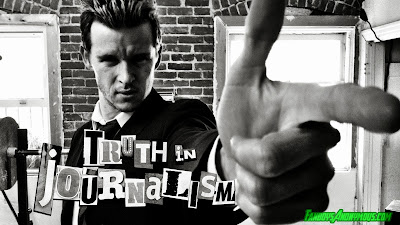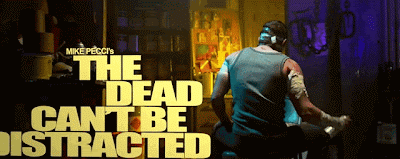 |
Pecci made a point in his blog that the film project, which cost him and his partners money out of their own pockets, is purely non-profit, and that before they began their endeavor they researched past successful fan films and made sure to abide by the United States' copyright and fair use laws. The film's purest intention could be ascertained from Pecci's first words in his response to the cease-and-desist:
I believe that there is a way to create a better and more successful Punisher on screen. Not just for the comic book fans, but for fans of action films, fans of violence, and fans of the iconic antihero. Frank Castle is more than a man with guns - he is a dead man on a mission. He needs to finally be represented with respect.The intention of the film—although its plot is based on and inspired by Rucka and Checchetto's story—should easily excuse it and its creators from Marvel Legal's attack since TDCBD falls under fair use. According to the FAQs on the website for the Organization for Transformative Works (OTW), "Fair use favors uses that (1) are noncommercial and not sold for a profit; (2) are transformative, adding new meaning and messages to the original; (3) are limited, not copying the entirety of the original; and (4) do not substitute for the original work."
Pecci and co. claimed to have created a transformed version of the Punisher that sets the character apart from previous portrayals in comics and films produced by Marvel. Although the story of the film is based on and inspired by the comics, Pecci notes that he and his partners were completely respectful of the source material and its creators/owners and that the film only makes use of select scenes from the comics to tell its story.
It seems, however, that fair use is not Marvel Legal's concern. Rather, they believe the film possesses the potential of confusing consumers into believing that the fan film—which is exactly what TDCBD is called in its subtitle: "A McFarland & Pecci Fan Film"—is an official or officially licensed/sponsored Marvel production. This argument opens up a rather sticky debate.
Prior to TDCBD, two other high-profile, impressively professional fan films were released on the Internet, both produced by Adi Shankar (executive producer of box office contenders The Grey and Dredd and self-proclaimed "bootlegger"): the recent Venom/Eddie Brock and Man Bites Dog-inspired short Truth in Journalism and his previous Punisher short, Dirty Laundry. Both stormed the fan film space with their expert storytelling and production quality, and Dirty Laundry even starred Thomas Jane, who reprised his role as Frank Castle from the 2004 Punisher film by Marvel and Tristar Columbia. Yet Marvel Legal never pursued these films or Shankar in respect to potential consumer confusion, and Shankar's two films never claimed to be "fan films" in their titles.
In regard to his successful Punisher fan film over this new, troubled one, Shankar addressed the situation with his reaction:
I think the underlying issue is that the filmmakers in question may have been a little over zealous in promoting their short prior to releasing it. Fan driven content strengthens ones brand and the community around it, and Marvel obviously knows this, as evidenced by the plethora of Marvel fan films and fiction on the Internet.This raises an interesting point: Pecci garnered a lot of fan excitement and interest prior to the film's indefinitely delayed release, whereas Shankar's two films suddenly appeared in their final cuts seemingly out of nowhere with little to no prior information on their existence. Additionally, Shankar's films were debuted at San Diego Comic Con, arguably garnering far too much fan support for Marvel Legal to pursue, especially since they were finished productions. Perhaps, then, the only way for a fan film (of these three productions' caliber and quality) to survive under Marvel Legal's radar is by surprise attack? Maybe, but I'm not quite sold on just this explanation.
 |
| Far better than Spider-Man 3. |
Maybe the issue is even baser than these possibilities. Perhaps this isn't merely a Marvel Legal issue; perhaps Pecci and co.'s collective egotistic efforts to create "A Better Punisher" isn't the only force to blame. I know I'm going out on a pretty shaky limb here, but I think Marvel—the company as a rights holder—won't accept a derivative version of their characters as better than what they own. Yes, I'm saying that Marvel's ego is also to blame. Think about it: which version of your favorite Marvel character—if you have one—is the best version of that character? Chances are that the officially published version is the most probable answer (yes, even the alternate reality versions of a character are counted). Whether you like the original Spider-Man, his 2099 version, or any of his film/TV counterparts, chances are you like the official versions more than you like derivative versions. Why? Because Marvel is the only entity allowed to have the better or best versions of their properties—at least, that is, according to what I'm reading from this entire situation.
"You really think that just because you have an idea, it belongs to you?" Yes, I quoted Obadiah Stane (Jeff Bridges) from Iron Man to juxtapose my argument, but I'm not comparing Pecci and co. to a megalomaniac super villain. Stane's words ring a truth: even if Marvel owns the exclusive rights to the Punisher and all of its characters, it doesn't mean they can't share its properties with its consumers in the light of improvement. Marvel knows it can't survive without its fans, and all of their creators who forge their ever-expanding universe started as fans.
When Marvel Legal explained to Pecci that his fan film could cause consumer confusion, he wasn't shocked by the lame excuse; he was flattered that his work was potentially on the level of one of Marvel Studios' official films. Marvel Legal's excuse is absurd, to put it bluntly. Even Shankar could do the math:
Best-case scenario a Punisher fan film gets 4 million hits on YouTube. Assuming it's an R-rated release, an official Marvel Punisher movie - financed and produced by Marvel and distributed by Disney, gets a P&A (prints and advertising) spend of at least $25 million USD (more if it's PG-13…vomit). Setting aside the TV spots and inevitable viral and outdoor campaigns, the trailer alone on its first two days on YouTube would garner more hits than the lifetime of any fan film. It would be akin to saying Batman: Dead End hurt the Nolan movies…. (Emphases are mine.)Even if TDCBD poses any threat, Marvel Legal shouldn't be breathing down Pecci and co.'s necks. The least Marvel could get out of the fan film is free publicity (which is what every fan-content creator brings to the table). If they're adamant about their official character being the best versions—versions their consumers can look to and know that these are legitimate Marvel creations—Marvel should take up Pecci's offer: "I want to make a Punisher online mini series. I want to do it with Marvel. I think that Frank's story is not suited for the hour and a half long format. Short episodes with a longer story arch would allow us to see who Frank becomes and how his war changes him." If TDCBD can accomplish what Pecci and co. set out to do, and if Marvel recognizes this great opportunity to offer their consumers "A Better Punisher," then by all means, Marvel needs to officiate the fan film instead of banishing it into nonexistence. Enough of this egotistic pissing contest legally rigged in Marvel's sole favor.
Regardless, the fact remains: Marvel's stance on fan-created content has blurred as a result of this mess. I don't mean fan films only; sure, fan fiction, art, and other content forms may not stand so clearly in the spotlight as TDCBD does at this time, but they are all derivative, transformative works skirting the copyright laws along fair use. Marvel Legal could turn and fire at any fan creator without a moment's thought, and I'd be back here, blowing the same whistle again. Between Shankar and Pecci's films and the legal bumps they've avoided or run into, where exactly does Marvel stand on the acceptance of fan-created content? Are they completely against it, or is there some tolerance, and this issue with TDCBD was them merely flexing their legal muscle? After this, Marvel needs to sit down with its consumers and draw the line. Even if and when they do, there will most definitely be undesirable backlash; but at least their stance will be explicitly clear, because right now all we can do is guess at what they're implying. It's not fair to Marvel's fan creators who can only learn these limits the hard way.
I once wrote fan fiction, but not anymore for developmental reasons. I'm of the belief that fan fiction is a good way for amateur writers to begin practicing their craft by writing about characters and stories that they love. Even now, I still have many ideas floating around in my cosmos and scrawled on scrap paper here and there about stories I'd love to publish with Marvel comics and produce as official Marvel films and TV shows. Right now, it's all fan fiction until it becomes official, but the fact remains that—after this—my derivative and transformative works are in no way safe from Marvel Legal. Nobody's fan-created content is until Marvel does two things: they need to outline the do's and don'ts when it comes to fan-created content; and they need to make TDCBD official in some fashion or at least give it the green light and drop the cease-and-desist. I believe that whatever happens next in this case will forever determine Marvel's relationship with its fans. Some damage had already been dealt as soon as Marvel Legal issued that letter, and more will result if they stand their ground indefinitely. They won't change by their own volition; for as big and scary as they are (doubly so now that they're backed by Disney), Marvel really does rely on its fans; and if our voices are loud and clear enough, I'm sure they will reconsider.
What are your thoughts on the issue with TDCBD and the legality of fan-created content in general? I'd like to hear your two cents on the matter, so leave a comment below!








